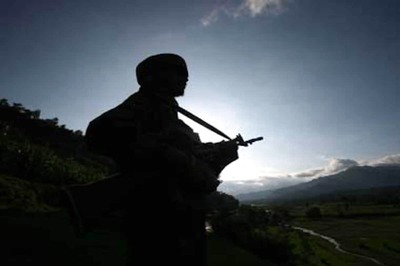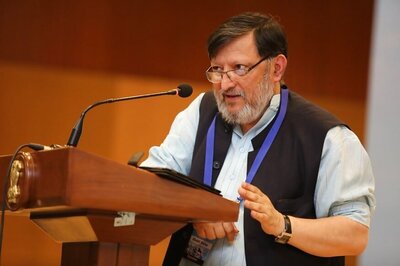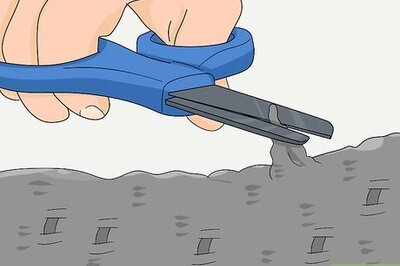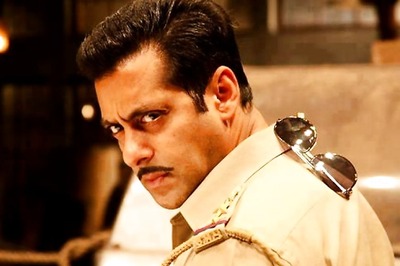
views
Islamabad: In a major shift from Pakistan's long-standing position, PPP Chairman Asif Ali Zardari, whose party is set to take reins of the country, has expressed readiness to set aside the Kashmir issue to focus on other aspects for improving relations with India.
He emphasised that the relations between India and Pakistan should not be held "hostage" to the Kashmir issue and that the two countries "can wait" so that future generations resolve the dispute in a mature manner in an atmosphere of "trust".
In views reflecting India's position, Zardari said he was determined to break the barriers and mindsets that deter trade between the two countries.
"The idea is that we feel for Kashmir, the PPP (Pakistan People's Party) has always felt for Kashmir. We have a strong Kashmir policy. We have always had one," he said.
"But having said that, we don't want to be hostage to that situation. That is a situation we can agree to disagree (on). Countries do, we have positions, you have positions. We can agree to disagree on everything," he told Karan Thapar's on Devil's Advocate.
Noting that India and Pakistan could "agree to disagree on (the UN resolutions)," he said "We can wait. We can be patient till everybody grows up further. Maybe the coming generation grows up even further and then let's interact as human beings and come to a position of love."
Asked if the PPP would be willing to put aside the Kashmir issue just as India and China had set aside their border dispute to focus on other aspects of their ties, Zardari said: "Exactly."
The statement marks a shift in Pakistan's stated position that Kashmir issue has to be tackled along with efforts on other fronts to improve relations between the two countries.
Pakistan has held this position despite India's repeated insistence that the two countries set aside the Kashmir issue because of its complexity and work for developing relations in other fields, particularly trade.
When bilateral relations improve, the two nations can come back and tackle thorny issues with the benefit of improved ties, Zardari, widower of former premier Benazir Bhutto, said.
"Today, there are fixed notions. When dependency increases (and) we have matured enough (and) we've got trust between us, then nobody has fixed issues," the PPP leader said.
Agreeing that Kashmir issue should be set aside for a wiser generation and a better time, he said: "As it is, it's going to be a no-border world in the end."
Asked about the Charter of Democracy signed by the PPP and the PML-N in 2006 that committed both parties to resolving Kashmir issue in line with UN resolutions, Zardari said, "I am not getting hostage to that issue."
Disagreeing that the Kashmir issue could best be sorted out while the army is in power in Pakistan, Zardari said people-to-people contacts and inter-dependence in trade could help negate the "fear factor" in both countries.
"Well, we've had army rule for eight years. Have they solved it? I don't need to convince them, it talks for itself," he argued.
While conceding that Prime Minister Manmohan Singh and President Pervez Musharraf "may have probably had the best understanding ever", he said: "I want to take (the relations) to a stage of such confidence-building that the fear factor diminishes from both angles.
"People-to-people contacts should be improved, then trade, inter-dependence of trade, if Indian industry depends on Pakistani energy and I depend on the Indian market for my product to be sold, we are both inter-dependent, financially integrated industry-wise."
Asked if there would be support across the Pakistani political establishment for his views, Zardari said: "I think the economical dependency that I'm talking about, nobody has really made the Pakistanis aware what position they are (in) and what they can gain.
"When they realise that they can change, the world will change. Economically, it's a thousand per cent leap we'll get into and the benefit of the thousand per cent leap is going to (have an) effect across the board."
About the response to a possible invitation for the new Pakistani Prime Minister to visit India, Zardari said he (the Prime Minister) would be accompanied by leaders from all other parties that are part of the government.
"I think the new PM of Pakistan will not only visit India, he will visit India with the political parties' leaders following him. When he gets down, he'll be first (with) me, Mr Nawaz Sharif (of PML-N), Mr Asfandyar Wali Khan (of ANP), hopefully Maulana Fazlur Rehman (of MMA), hopefully Mr Altaf (Hussain)'s party (MQM). We should all walk behind him, greeting India," he said.
The PPP leader added: "I think we should go further than that. Just not visiting and meeting... Let's hit the road running let's meet with concrete steps, let's talk about SAARC, modern technology."
Asked if such a move could trigger a backlash in Pakistan, he replied: "That's what leadership is all about, that's what popularity is all about the fact that I do something with the will of the people is my plus, not my minus."




















Comments
0 comment